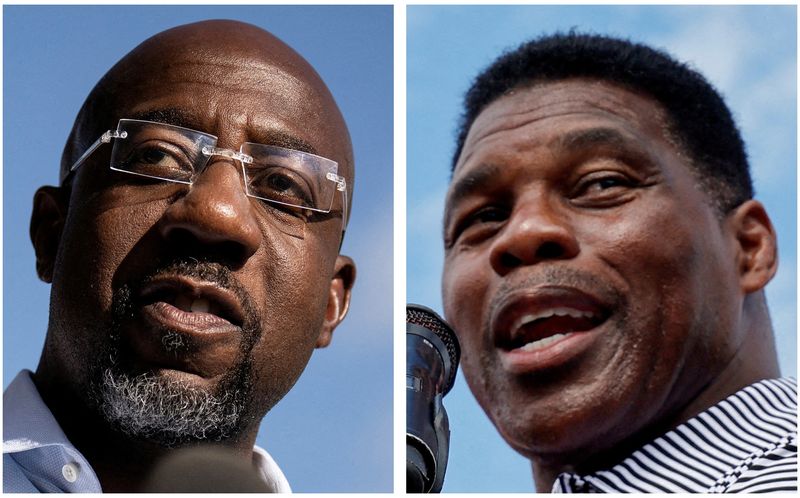By Nathan Layne
(Reuters) - Even before the contest in Georgia between Democratic Senator Raphael Warnock and his Republican challenger Herschel Walker headed for a Dec. 6 runoff, a staggering $262 million had already been spent on the race.
Now, with control of the U.S. Senate possibly hinging on the match-up, political analysts expect the campaigns to unleash an advertising blitz and boost spending to levels approaching the historic runoffs in Georgia two years ago.
"Just start adding zeroes and stop when you feel like it," said Chuck Clay, a former state Republican chair and former state senator. "Money is going to be no object on either side."
While Republicans are edging towards a majority in the House of Representatives, the Senate remains up for grabs, with large numbers of votes still being counted in Arizona and Nevada. If the parties split those seats, the runoff in Georgia will determine control of the upper chamber.
So far, spending by the Warnock and Walker campaigns and outside groups totals $262 million, according to OpenSecrets, a nonprofit that tracks money in politics. For a midterm, that ranks second to the $372 million spent on this year's Senate race in Pennsylvania.
The most expensive race ever was the $515 million contest between Georgia Republican Senator David Perdue and Democrat Jon Ossoff, which Ossoff won in a runoff in January 2021.
For months, Georgians have been inundated with television ads about Walker and Warnock, and political experts say there are likely very few voters who have not made up their minds.
But in a race where a few thousand votes could make a difference, the campaigns will continue to flood the airwaves, while investing big in get-out-the-vote efforts. Outside groups are expected to ramp up spending on negative attack ads.
Sheila Krumholz, OpenSecrets’ executive director, predicted at least $100 million more in outside spending through Dec. 6.
"Both parties have every incentive in the world to try and win," said Andra Gillespie, an associate professor of political science at Emory University in Atlanta. "It’s going to be bare knuckles for the next month."
TRUMP FACTOR
The runoff was triggered automatically because Warnock, while narrowly leading Walker with more than 99% of the vote counted from Tuesday's election, failed to reach the 50% threshold needed to secure outright victory under Georgia law.
Warnock, a pastor at Ebenezer Baptist Church, the Atlanta church civil rights leader Martin Luther King Jr. led, first won his seat in a runoff in January 2021.
His latest runoff could determine whether Democrats, who control the evenly-split Senate because Vice President Kamala Harris holds the tie-breaking vote, cede the majority to the Republicans for the remainder of President Joe Biden's term.
In an email to supporters on Thursday, the Warnock campaign expressed confidence, citing the operational infrastructure that led him to victory against then-Republican Senator Kelly Loeffler in 2021, and vowing to ramp up voter-mobilization efforts.
The campaign also cited Warnock's performance in urban counties, which at 79.4% of the vote outperformed Biden's 77% in 2020.
Clay, the former state Republican chair, sees an advantage for Warnock in his potential to boost turnout in the populous urban areas, including Atlanta. Walker, on the other hand, might be able to persuade some of the 2% of voters who supported the Libertarian candidate, as well as conservatives who chose not to vote for the Senate seat on Tuesday but now may do so with control of Congress hanging in the balance, Clay said.
Some Republican voters said they hoped popular Republican Governor Brian Kemp, who had somewhat distanced himself from Walker during the general election, would provide support. Kemp outperformed Walker by nearly five percentage points, as some Republicans abstained from voting for Senate or opted for Warnock.
"I think Kemp is going to have to do something for him," said Roy Salemi, a 59-year-old financial analyst from Milton, Georgia, who voted for Walker in a party-line vote. "Republicans need that seat."
Trump, whose endorsement of Walker helped clear the Republican field for the former football star, could also prove a deciding factor in the runoff.
Prior to 2021, when Trump's falsehoods about the 2020 election being rigged led many Republican voters to abstain from voting in the runoff, Republicans had won all seven general election runoffs held in Georgia, according to Charles Bullock, a political science professor at the University of Georgia.
Bullock said if Trump decided to campaign in Georgia for the runoff it would be bad for Walker, given that some Republicans have moved on from the former president, especially after the party underperformed expectations in Tuesday's midterm elections.

"I think Democrats would pay for his airfare," Bullock said of Trump. "He can mobilize his base, but he also mobilizes individuals who are likely to vote for Democrats."
(This story has been refiled to fix the spelling of professor's name in paragraph 10)